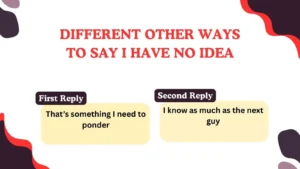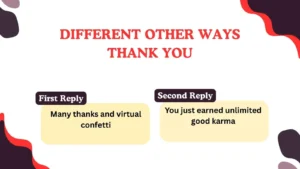When writing, whether it’s a story, an essay, or even a text message, using the word said over and over can get boring. Luckily, there are so many other ways to express how someone is speaking! In this article, we’ll explore 220 alternatives to said that can make your writing more vivid and engaging. Let’s dive in!
Expressing Neutral or General Speech
Sometimes, you just need a simple way to show someone is talking without adding extra emotion. Here are 20 neutral alternatives:
- Mentioned
- Stated
- Noted
- Commented
- Observed
- Added
- Explained
- Shared
- Declared
- Announced
- Responded
- Replied
- Answered
- Concluded
- Revealed
- Suggested
- Pointed out
- Continued
- Clarified
- Specified
These words are great for everyday conversations or when you want to keep the tone straightforward.
Showing Excitement or Enthusiasm
When your characters are excited, their words should reflect that energy. Try these 20 lively options:
- Exclaimed
- Cheered
- Gushed
- Raved
- Shouted
- Yelled
- Squealed
- Chimed in
- Beamed
- Celebrated
- Laughed
- Joked
- Praised
- Enthused
- Proclaimed
- Rejoiced
- Bubbled
- Glowed
- Marveled
- Ranted
These words can bring a scene to life, especially when someone is overjoyed or passionate.
Conveying Anger or Frustration
Angry dialogue needs strong words to match the emotion. Here are 20 ways to show someone is upset:
- Snapped
- Shouted
- Yelled
- Growled
- Barked
- Fumed
- Raged
- Scolded
- Grumbled
- Complained
- Hissed
- Roared
- Retorted
- Accused
- Demanded
- Challenged
- Protested
- Sneered
- Insisted
- Blurted
These words help convey tension and conflict in your writing.
Expressing Sadness or Disappointment
When a character is feeling down, their words should reflect that mood. Try these 20 softer alternatives:
- Whispered
- Mumbled
- Sighed
- Moaned
- Sobbed
- Cried
- Wailed
- Mourned
- Lamented
- Groaned
- Pleaded
- Begged
- Confessed
- Admitted
- Murmured
- Whimpered
- Hesitated
- Faltered
- Choked
- Grieved
These words add depth to emotional scenes.
Demonstrating Thoughtfulness or Uncertainty
Sometimes, characters are unsure or deep in thought. Here are 20 ways to show that:
- Paused
- Wondered
- Pondered
- Considered
- Reflected
- Hesitated
- Questioned
- Doubted
- Debated
- Guessed
- Speculated
- Theorized
- Mused
- Contemplated
- Brooded
- Deliberated
- Supposed
- Surmised
- Inquired
- Wavered
These words are perfect for introspective moments.
Showing Agreement or Support
When characters agree or back someone up, these 20 words can help:
- Agreed
- Concurred
- Acknowledged
- Affirmed
- Approved
- Endorsed
- Supported
- Encouraged
- Confirmed
- Validated
- Seconded
- Backed
- Consented
- Assented
- Ratified
- Sustained
- Reinforced
- Championed
- Vouched
- Corroborated
These words are great for positive, supportive dialogue.
Conveying Disagreement or Doubt
On the flip side, when characters disagree, try these 20 options:
- Argued
- Objected
- Disputed
- Challenged
- Denied
- Rejected
- Contradicted
- Countered
- Opposed
- Protested
- Refuted
- Defied
- Questioned
- Doubted
- Criticized
- Interrupted
- Rebuffed
- Resisted
- Disapproved
- Contested
These words help show conflict or skepticism.
Adding Humor or Playfulness
For lighthearted or funny moments, try these 20 playful alternatives:
- Teased
- Joked
- Quipped
- Bantered
- Chuckled
- Giggled
- Snickered
- Laughed
- Jested
- Ribbed
- Poked fun
- Mocked
- Played along
- Smirked
- Grinned
- Winked
- Nudged
- Taunted
- Jestfully said
- Lightly remarked
These words are perfect for keeping the tone fun and engaging.
Expressing Fear or Nervousness
When characters are scared or anxious, their words should reflect that. Try these 20 options:
- Whispered
- Stammered
- Stuttered
- Trembled
- Shuddered
- Gasped
- Panted
- Hesitated
- Faltered
- Pleaded
- Begged
- Urged
- Warned
- Implored
- Quavered
- Shivered
- Fretted
- Panicked
- Cowered
- Breathed
These words help create a sense of tension or unease.
Showing Authority or Command
When a character is in charge or giving orders, these 20 words can help:
- Ordered
- Commanded
- Directed
- Instructed
- Demanded
- Dictated
- Decreed
- Ruled
- Asserted
- Insisted
- Proclaimed
- Advised
- Guided
- Urged
- Pressured
- Compelled
- Enforced
- Governed
- Regulated
- Controlled
These words convey power and confidence.
Expressing Love or Affection
For tender, heartfelt moments, try these 20 loving alternatives:
- Whispered
- Murmured
- Cooed
- Sighed
- Breathed
- Adored
- Cherished
- Praised
- Complimented
- Admired
- Confessed
- Professed
- Declared
- Affirmed
- Reassured
- Comforted
- Encouraged
- Nurtured
- Embraced
- Glowed
These words add warmth and emotion to romantic or caring dialogue.
Conclusion
Using the same word over and over can make your writing feel flat and repetitive. But with these 220 alternatives to said, you can bring your dialogue to life! Whether your characters are excited, angry, thoughtful, or loving, there’s a perfect word to match their tone and emotion.
Remember, the key is to choose words that fit the context and enhance the mood of your scene. Don’t overdo it—sometimes said is just fine! But when you want to add a little extra flair, this list has you covered.
So, next time you’re writing, try swapping out said for one of these alternatives. Your readers will notice the difference, and your writing will feel more dynamic and engaging. Happy writing!

I’m Jane Austen, a content writer at SmartRaply.com. I create clear, engaging, and reader-friendly articles on modern and trending topics. My goal is to deliver high-quality content that informs, inspires, and keeps readers hooked.



